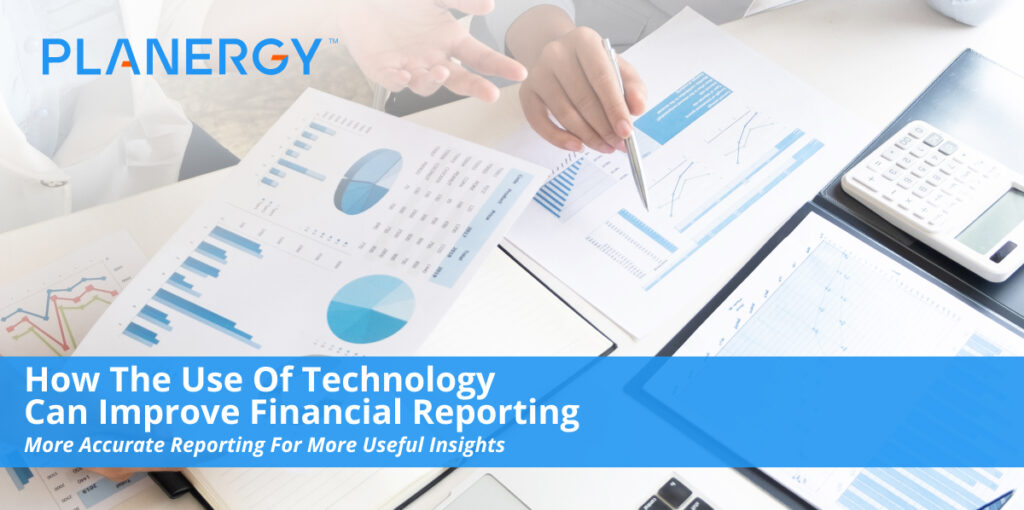From Wall Street to small towns and everywhere in between, financial teams labor mightily month after month to complete the financial reporting process.
Their goal: delivering the data executives use to make business-critical decisions on everything from budgets to business process management.
To provide maximum possible value, financial reports need to be timely, accurate, and complete—particularly in today’s fast-paced global economy. But that’s a task more easily said than done.
Saddled with outdated workflows and lacking the proper tools, financial professionals at both large and small businesses struggle to complete the financial reporting process in time to provide actionable insights that deliver value.
Happily, today’s advanced digital technologies can take the pain out of reporting. Understanding how the use of technology can improve financial reporting begins with understanding the capabilities of today’s advanced digital tools, and how they can help you collect, manage, analyze, and deliver financial data with greater speed, accuracy, and utility than ever before.
Modern Financial Reporting Requires Speed, Accuracy and Clarity
The modern market moves at unprecedented speed. More and more, companies eager to gain and maintain competitive advantage seek digital solutions that will help them achieve greater efficiency, speed, accuracy, and transparency.
As a result, the traditional approach to financial reporting—a long, arduous process that required substantial labor from a large staff—no longer cuts the proverbial mustard in a world awash in Big Data.
The primary challenge in dealing with all this big data can be best expressed in the “three Vs”: variety (different data sources), velocity (the rate at which data is being generated), and volume (the amount of data generated).
In financial business reporting, as in other areas, taking on the massive flow of information that comes with doing business with manual workflows and printouts isn’t just tilting at windmills; it’s tilting at Godzilla with a butter knife.
With data in plentiful (and potentially overwhelming) supply, it is critical that businesses have strategies in place, and tools at hand, to organize and analyze it if they hope to harvest it for insights rather than being crushed beneath it.
Chief financial officers (CFOs) and other stakeholders expect the finance function to optimize its reporting processes (e.g., accounts payable (AP) reporting) to deliver results as quickly as possible—and, in many cases, in real time.
They need, and expect, financial data they can mine for actionable business insights they can use for better decision making.
They often struggle to get it: in Deloitte’s 2016 survey of more than 600 CFOs and other senior financial professionals, 53% of respondents reported data quality as a problem within their organization.
For those businesses without executive sponsorship for digital transformation to enhance financial reporting, that value jumped to 80%.
And while Deloitte’s research found that leveraging standardization—along with new technologies and their related skills—freed team members in the finance function to interact directly with the business rather than devoting their time and energy to reporting, only 35% of those surveyed felt their current level of technology supports effective financial reporting and analysis.
In fact, survey respondents indicated their financial functions spent nearly half (48%) their time generating and updating financial reports and less than a fifth (18%) communicating those results to stakeholders.
In addition to ensuring financial and legal compliance with accounting standards, one of the most important roles finance plays in any organization is providing business insights.
It has become increasingly clear that, without support for and investment in new technologies, companies will struggle to harvest and leverage those insights while they’re fresh and actionable.
By embracing powerful and innovative digital transformation technologies such as artificial intelligence (particularly machine learning), robotic process automation, and advanced data analytics, finance leaders are redefining the financial reporting process to prioritize speed, accuracy, transparency, and utility.
One of the most important roles finance plays in any organization is providing business insights. It has become increasingly clear that, without support for and investment in new technologies, companies will struggle to harvest and leverage those insights while they’re fresh and actionable.
Key Benefits of Digital Technologies in Financial Reporting
They might sound like something from Asimov, but the growing importance of information technologies such as machine learning and deep data analytics is anything but fictional.
Within the finance function, the use of these technologies may reasonably be considered financial technology, or fintech, and they form a core component of data-driven, value-focused business models.
For example, implementing a comprehensive, next-generation procurement software solution like PLANERGY provides three key fintech components to both procurement and accounts payable (including financial reporting): artificial intelligence (AI), robotic process automation, and advanced data analytics.
In addition to establishing a foundation for digital transformation across the organization, these technologies provide immediate value through centralized, cloud-based data management and optimization of procure-to-pay processes for accuracy, speed, and transparency.
This optimization sets the stage for the benefits fintech brings to financial reporting, including:
- Higher-quality data from all sources. For top-notch business insights, you need to start with high-quality data that’s complete, accessible, and accurate.
Fintech enhances data quality and availability through:- Centralized data collection, organization, and management.
- Lower information management, preparation, and publishing costs.
- Standardization ensures consistency across workflows and helps streamline integration.
- Integration with diverse data sources to remove silos and support a wide array of reporting formats on both mobile and desktop platforms.
- Automating data entry and other tedious, high-volume tasks eliminates human error, increases speed and accuracy, and provides higher-quality data.
- Cloud-based, role-appropriate access to spend, performance, and other data via dashboards, streamlining reporting and replacing countless spreadsheets and binders with fast, accurate reporting in the office and on the go.
- Centralized data collection, organization, and management.
- Powerful and intuitive procurement analytics that allow finance teams to establish and monitor key performance indicators (KPIs) to identify areas in need of improvement, new opportunities for strategic spending and investment, and incorporate continuous improvement to build value and reduce risk.
Over time, optimized processes improve data quality while making it available more quickly. - Automated reporting capabilities that put powerful data analytics at your fingertips.
- Custom reporting tools make it easy to sort and analyze data by project, department or vendor.
- Generate a Goods Received Not Invoiced (GRNI) report in real time to streamline accrual accounting.
- Decision makers can draw on centralized, complete, and transparent committed spend data, decision makers can compare it to budget reports in real time to confidently prioritize and adjust spend to support company goals while protecting cash flow.
- Real-time, interactive data management that does more than just eliminate paper. In addition to direct access to reporting tools for stakeholders, machine learning technologies like natural language processing allow users to interface with Chatbots connected to your data stream, automatically creating custom reports to provide self-service answers to their questions on demand. As a result, finance becomes a source of both immediate and long-term value as well as cost savings.
- Empowering your team to spend more time on supporting organizational goals through relationship building, advanced analysis, and innovation instead of manually processing data in spreadsheets that may be obsolete before the printer clicks off.
- Using technology to protect business continuity by enabling your team to work remotely without interrupting operations. Benefits like mobile-friendly remote access and minimal requirements for human intervention are of substantial interest to companies fighting to survive in a world still reeling from the COVID-19 pandemic.
Consider this: in its Q2 2020 edition of CFO Signals—a quarterly report designed to provide a snapshot of opportunities for and challenges faced by CFOs and other financial thought leaders—Deloitte stated CFOs “expect major increases in remote work, automation, and cloud computing” for 2021. These same CFOs anticipate reducing physical facilities where possible, but continuing to focus on complex, strategic, and resilient supply chains.
Translation: in the coming months and years, financial technology will become more important to competitive performance than ever before as companies reduce their need for physical assets and move their processes and people to the digital realm.
Put Fintech to Work in Your Financial Reporting Process
Beyond adopting a procurement and AP automation suite, you can further support your finance team’s goals for faster, more accurate, and more complete financial reporting by:
- Securing executive buy-in. As Deloitte’s research shows, executive buy-in has a powerful impact on an organization’s ability to incorporate information technology and next-generation digital tools into their financial reporting process. Investing in education and demonstrating the potential of automation, artificial intelligence, and data analytics can help you secure support from the C-Suite in optimizing your reporting and reaping the associated benefits.
- Going at your own pace. Small businesses may not be ready to go all-in on a complete digital transformation solution out of the gate, and some larger companies may be transitioning away from legacy systems that require time and effort to shut down. Regardless of the situation, it’s perfectly acceptable to bring digital tools into your financial reporting in stages based on your business goals, needs, and budget.
Find a provider who will work with you to build a digital transformation roadmap and provide support as well as software along the way. They can also help you gain executive support by providing industry-specific examples of past clients they’ve helped to optimize their financial reporting and other business processes. - Prepare for a major shift in leveraging human capital. As automation and analytics make reporting more accessible, more accurate, and less time-consuming, your team will have more time to devote to higher-level tasks. Insights will be available without the need for tedious grinding, so time and talent can be devoted to collaborating with other staff from across your organization to strategize, build a more resilient and strategic supply chain, and form deeper, more valuable partnerships with key suppliers.
Be ready, too, to adopt other technologies and policies—remote work, greater cybersecurity for both your networks and your data, etc.—to support your both business continuity and your overall digital transformation strategy.
Harness the Power of Technology for Optimal Financial Reporting
Quality data leads to quality insights—and better business decisions. Swift and accurate processes deliver financial data to decision makers when they need it.
The future of financial reporting is digital, strategic, and real-time.
And for thought leaders who are ready to embrace the power and potential of fintech, that future is filled with higher productivity, more strategic spending, and competitive advantage driven by innovation.




